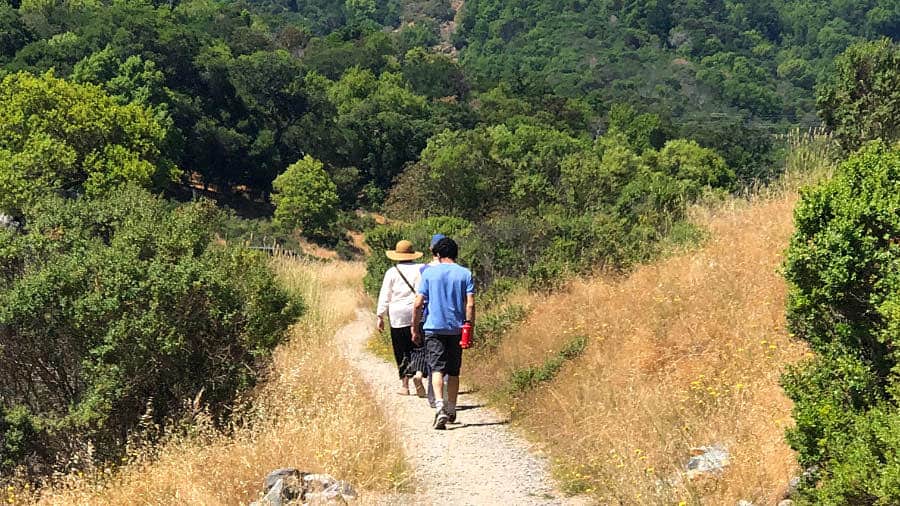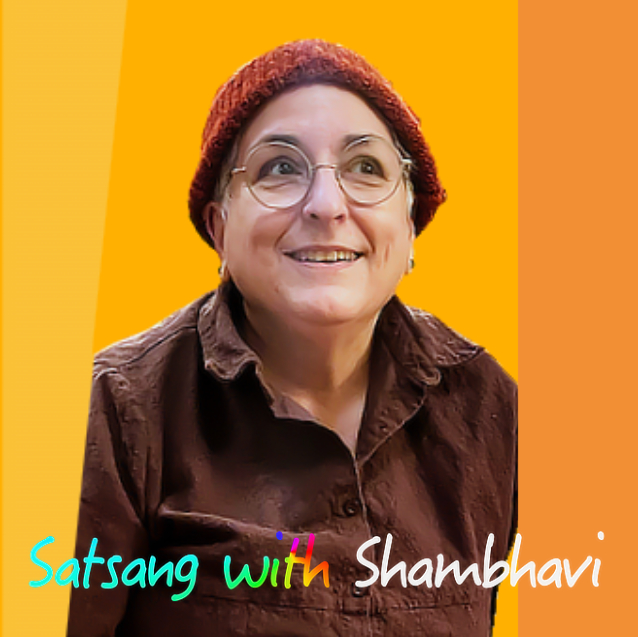We can learn to directly consult and follow promptings from the wisdom heart. A podcast from Satsang with Shambhavi
SHAMBHAVI
So who has a topic for me to riff on?
STUDENT 1
Getting real about what we actually want.
SHAMBHAVI
Yeah, that takes a while. [laughter] There's a few tricks to that, tricks of the trade. [laughs] One is learning how to listen to the wisdom of the heart as it's spontaneously arising.
The heart space in the center of the chest is a sandhi. It's a gap. It's a portal. And it is a place where we can listen to and feel for promptings from unconditioned wisdom. Wisdom that is not squished by karmas.
We can actually take breaks from our usual karmic way of relating to everything, our bound, limited way of relating to everything by learning how to listen to the promptings of the wisdom heart. They can be very fleeting, especially in the noise of our karmas.
It's like we're standing in the middle of a giant twelve-lane freeway full of traffic, trying to listen for this tiny little voice that is somehow different from that traffic. The beauty of it is that it just takes practice.
It just takes some small kernel of confidence to get you going. And then the really powerful gesture of following it. Listening to that voice of wisdom. Or feeling of wisdom. Or impulse of wisdom.
It's not always like a voice. It could strike people in different ways. However it comes to you, there's a sense of incontrovertible certainty about it beyond any argument.
When we have a different kind of certainty coming more from our karmas—I know he loves me even though he says he doesn't, I just know it—that kind of certainty requires continual argument. Continual case-building to keep it propped up.
It's fraught with anxiety, and it has that feeling of repetitiveness about it. But when that feeling of certainty is coming from the heart space, it has a quality of imperviousness to our arguments.
We may ignore it. We may walk away from it. We may tell it, no, you're too inconvenient. I'm not going to follow you. But we can't argue with it. It has this quality of certainty, in a different way than our normal karmic certainties have.
I was extremely fortunate that one of the very first spiritual teachers I had back in my 20s, her entire teaching was how to listen to the wisdom heart. She didn't call it that. She called it following your intuition. But it wasn't emotional intuition. It was this clarity intuition of wisdom.
And she had all these different things she taught us, largely out of the kriya yoga traditions from India, of how to listen to this and how to follow it. I had already kind of identified that there was something to follow. That was coming out of me in some way.
Or in me telling me what was the right thing to do for me, and what was not the right thing to do for me. But she gave me a lot of practice and a lot of techniques for listening to that more so it gets louder and louder.
And more insistent, the more you listen to it. And for finding the courage to follow it. And so what I learned from that very early experience in my life was that, first of all, this prompting from the wisdom heart is never wrong.
Whatever it's telling you to do, no matter how outside of common sense it is, which it's not always outside of common sense, but sometimes it is. It is always the best course to follow. It will always give whatever the best result is possible in a certain situation.
And so over time, incrementally following it over and over and over and over again, everything begins to strengthen. You begin to have more access to what it is that you really want. You begin to have more clarity about that.
You begin to have more confidence in yourself as somehow being guided by this wisdom. So it's not confidence in yourself like, this weird independent psychological self that we've signed on to seemingly auto-renew subscription. [laughs]
It is that Self, the Self that pervades everything. But that's also us. So it feels extremely intimate. It's very fleeting at first, but then eventually, the more you listen, the stronger and stronger and stronger it gets.
And then it just becomes impossible not to follow it. Because you know that it's giving you the best possible direction to go in, in any particular situation.
The more karma that we have, the more impacted patterns that we have in any particular area of life, the harder it is to find that wisdom voice. Or that wisdom feeling. That wisdom prompting. And it's easier in areas of life where we have less.
It's like a muscle, and when we use it, it gets stronger. And we gain tremendous confidence. The biggest fruit that I had from practicing with that teacher in my 20s was, I got confidence.
I don't want to say in myself, because I didn't feel like there was some sort of separate me running around that I was going to have confidence in. I had confidence in the way that I was living, following this wisdom.
I had confidence in that wisdom. And I had confidence in the method of being in the world that I had. I don't even know if I chose it because it just sort of happened.
At the time when I met this teacher, I had no knowledge of any practices from India. It was a long time ago. There were not yoga studios on every corner. I'd never read anything about India.
I did not know anything about Hinduism. I mean, nothing. I had no knowledge of this area of life. And the weird thing is that I cannot remember why I went to this workshop.
It's like a blank. It's almost like someone just sort of threw me into the workshop without any preamble. Actually, the teacher who was teaching this even though she was teaching largely kriya yoga, she didn't say what she was teaching was from India. She didn't use any Sanskrit words. I had no idea what it was.
And it was only my next teacher after that told me that it was from India. As know-nothing as I was, the methods that she taught me became the warp and woof of my minute-to-minute everyday experience.
I use these methods constantly to navigate. We slowly discover what we really want by consulting the heart. By learning to consult wisdom directly in some way or another, that tells us what it is we really want.
And then there's many, many other ways that what we really want could become apparent to us. And this falls under the Dzogchen heading of liberating appearances.
We all want stuff. [laughs] We spend our whole days wanting things. All of those things we eventually discover are all the same thing. They're all a desire to discover who we really are or what's really happening here. And to find our real home.
All of our attempts to establish refuge and impermanence in relationships and things that we own, houses and cars and jobs, and things like that. Earning money.
Whatever way we live. Whatever way we try to establish a sense of refuge. In the midst of that, we find that what we really want is knowledge and home.
And those two are very intimately related. Because we don't find knowledge until we go home to the heart. Everything that we're doing, no matter how wayward it is, no matter how far it seems from spiritual life or what anyone might call a spiritual life.
Everything we're doing is an attempt to reconnect with that sense of home and the continuity of the Self. Every single thing we're doing. So in the midst of our everyday lives, in the midst of all of our compulsions, we can discover what it is we really want.
And usually we only get glimpses of it and then we go off on some other tsunami of karma. Leading us away from it, for maybe even lifetimes. Who knows? But eventually we just keep coming back to it.
I think that one thing that serves us is when we recognize something, when we have those moments of recognition. Recognizing the recognition.
Understanding how important it is. Not just going, oh, that's inconvenient. Or I'm just going to turn away from it. That's a form of honesty or a form of sincerity.
The other thing is letting our longing lead us. The longing to find our real home, our real refuge. To reconnect, to feel our connection with everything. That longing is mighty.
And when people start to feel that longing, they often get scared because it's terribly ungovernable. [laughter] And I think people recognize that on some level, even if they don't have words for it.
Your karmas are a way of governing the energy of life. So when we start to feel that live wire of connectivity, sometimes we put the brakes on really strongly. And one way of discovering what we really want is to notice when we're doing that and try not to do that.
Try to let ourselves get swept away. Let things get a little bit chaotic. Let yourself not know what's going to happen next. Let yourself not do the stale thing you always do.
Let the opportunity end. That's another thing you can do to find out what you really want. But the thing is, we really all want exactly the same thing. It's just being costumed in different ways according to our karmic unique dimension.
STUDENT 2
Just knowing in my own life that there are big decisions I'm going to have to make, in order to commit more fully to practice. Starting to have that realization. I just wondered if you had talked about when you've had to make some big steps, away from things that were obstructing your potential for realization.
SHAMBHAVI
First of all, let me say that we live in a very competitive society. And so some people think, oh, I have to get to that point where I have to give up all these things.
All over the world, there are billions of people doing spiritual practice every day without any thought of being great practitioners or having some great result. Without any thought that they're going to change their lives one iota, other than to do half an hour of practice a day or whatever they're doing.
Our feeling in this culture that we're on some sort of trajectory toward being great in every aspect of our lives, is just a huge obstacle to spiritual life. The only place that we can really practice from and expect any fruit is the place where we actually are, not the place that is filled with these narratives of accomplishment.
The best attitude anybody can have is to just put one foot in front of the other. Do some practice every day and don't think about the result. Just do it and see what happens, and go about your life.
So then there's the question of desire. The people who make those so-called big decisions do it because they desire to do it. Not because they're forced into it or their teacher told them to, or they have some narrative in their mind.
We do things because we want to and we don't do things because we don't want to. If you honestly have the desire to find out what the fruit of a practice like this is in a fuller way, and you really have a strong yearning inside of yourself, then as Ma said, whatever needs to fall away will fall away.
It may look like a decision, but it won't feel the same as an ordinary decision. For instance, I left academia. I had a very good job teaching at a very good university.
It was not anything that had anything to do with my spiritual practice and other things were more important to me. And I just left. There wasn't any big soul-searching about it. It was just time to go and I went.
And that's how most of the big decisions have been for me. Decisions that might look big from the outside, oh, you left a tenure track job in academia. People say, you did? How was that? It just really was not a big deal because my desire for something else was very very strong.
On the other hand, when we get into areas of life where we have a lot of karmic impaction, a lot of things happening that are obstructing, then those things are harder.
They're more painful. Because we're basically having to use a lot more force to move in a different direction from those karmas. And for me, that's around housing.
I was reading something about the configuration in my fourth house in my astrology chart, which relates to housing. And this very well-trained Jyotishi was writing about that exact configuration.
And talking about how it often indicated long-time ancestral karma that you really didn't have anything to do with, but you just kind of inherited it. And it's very very difficult. And often extreme measures have to be taken to unwind that.
And so for me, for instance, moving back to Portland and all the housing and space things that have gone on. Like looking for different spaces and looking for housing for me. And trying to follow in different ways what I think I'm being told to do, was very very difficult.
It's not that I had something else I wanted to do. It's just the whole thing was difficult. It's hard to describe, but it was kind of agonizing. And through that process, I can see that certain things are unwinding.
Like right now, for the first time in my life, I'm 65. I have two good landlords. We have a landlord here in this commercial space that has welcomed us into this space with such tenderness and care.
It's just mind-blowing. This is like an unwinding that's happening. And there's still a lot of karma wrapped up in this. But I can feel that because I followed to the best of my ability, even if my following was stumbling, I really did my best. There are fruits of that.
There are fruits to going through those very difficult times of following. When you're moving through a very impacted area of your life. Your yearning is what carries you.
And sometimes that yearning. If you're being honest, and you're not just manufacturing this sense of urgency or manufacturing some sense of, I have to be a great practitioner. Or I want to be the number one student, or whatever people think.
If it's really honest, then most of the time I find it's pretty easy to give up whatever needs to be given up, or let it be taken away. Every now and then you have a really really rough patch with it, and you just do your best. But it's still that longing that is carrying you, 100%.
STUDENT 3
What if your desire is to just sit in front of YouTube and watch videos all day?
SHAMBHAVI
Do it wholeheartedly. [laughter] No. That's a form of stagnancy. So that's like indicating stagnancy in your system. If I were in that condition, I would go get acupuncture. I would try to move. Go out in nature more.
Shake up your channels more. Because the desire is coming from stagnancy in your channels. We just cannot overestimate the impact of the pandemic. I think even people who don't tend toward stagnancy have experienced some stagnancy.
Not getting the variety in our lives of people that we're seeing. Not getting the variety of seeing different environments. Feeling heavy and sad about all kinds of things, not just the pandemic. This has just been an extraordinary time to try to maintain through.
So we just have to try to take smaller measures. But get some help. Acupuncture and herbs would be good. Even just jumping up and down. Doing unstructured movement, like dance. Flailing around and jumping, and being just chaotically exuberant.
Try to do something every day that is surprising. Change up your routine in small ways, but don't think you have to do a million things all at once. And you don't have to do it on your own. There's plenty of help that you can get.
Sign up to receive email updates
Enter your name and email address below and I'll send you periodic updates about the podcast.


